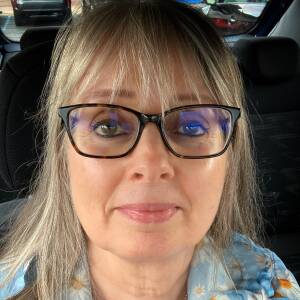Throwback Thursday: Tools of the Trade
When I first trained as a BBC Radio Studio Manager (sound engineer) in 1985, we were still recording, editing and playing out our programmes on reel-to-reel tape. Our essential kit was a white chinagraph pencil to mark the tape with, a single-edged razor blade to make the cuts on a metal editing block, a roll of splicing tape to stick the cut pieces of tape together and a pair of headphones to listen to what we were doing while the rest of the programme was coming out of the main studio loudspeakers. The headphones in my blipfoto are an original black bakelite pair which were widely in use when I started working for the BBC in the late 70's. To this day, they are the 'cans' of choice for Woman's Hour presenter Jenni Murray, Midweek's Libby Purves, and presenter of The Reunion Sue MacGregor. Incidentally, I first worked on Woman's Hour when Sue was still presenting it, before she left to work on Radio 4's Today. In the olden days of tape, I always had little cuts on my fingers where I'd nicked them with the razor blade when editing in a hurry, and an aching back from bending over the tape machine for hours on end. However, tape editing was a proper craft - we even used to refer to it as "stitching the programme together". For the last 20 years, we've increasingly been going over to editing on the ubiquitous computer, and the last time tape was used in Broadcasting House was around 2006 just before we moved back into a totally refurbished Old Broadcasting House, now fully equipped for the new digital age.
My fresh-faced course - all in our 20's - are pictured only a few weeks into our first training course in the summer of 1985. We were in one of the training studios in The Langham opposite Broadcasting House, now the 5-star Langham Hotel, which was then owned and occupied by the BBC. Thirty years later, three of my original course-mates - Jeremy, Adrian and Barry joined me for my retirement party at the end of March. Another course-mate, Vicky, retired from Studio Management at the same time as me, leaving only one of our original course still working as a Studio Manager. Everyone else has either left the BBC altogether or become a producer or manager. Sadly, at least one (and possibly two) people who are pictured in the photo with me have died.
The final item issued in our 1980's toolkit was a little screwdriver. No, not to fix the studio if/when it went wrong. It was to adjust the calibration of the Dolby noise reduction system which was in use at the time. In today's rather more tricky times at the BBC, I think a Sonic Screwdriver might be more use to my recent team-mates.....

Comments
Sign in or get an account to comment.


